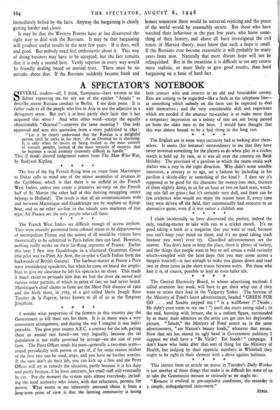I wonder what proportion of the farmers in this country
pay the Government to kill their rats for them. It is in many ways a very convenient arrangement, and during the war I imagine it was indis- pensable. You give your county A.E.C. a contract for the job, paying them an annual rate based—not very logically, because the rat population is not really governed by acreage—on the size of your farm. The Pests Officer sends his men—generally a two-man team— round periodically with poison or gas or, if for some reason neither of the first two can be used, traps, and you have no further worries. If the men don't do their job, you can kick up a fuss and the Pests Officer will try to remedy the situation, partly because it is his duty and partly because, if he loses contracts, his small staff will eventually be cut. For the moment the system suits almost everybody, includ- ing the local authority who issues, with due reluctance, permits for poison. What seems to me inherently unsound about it from a Jong-term point of view is that the farming community is losing
both contact with and interest in an old and formidable enemy. Rats are coming to be regarded—like a fault in the telephone line— as something which nobody on the farm can be expected to deal with themselves ; and the very considerable skill and experience which are needed if the amateur rat-catcher is to make more than a temporary impression on a colony of rats are not being passed on from the older men to the boys. I would have thought that this was almost bound to be a bad thing in the long run.


































 Previous page
Previous page